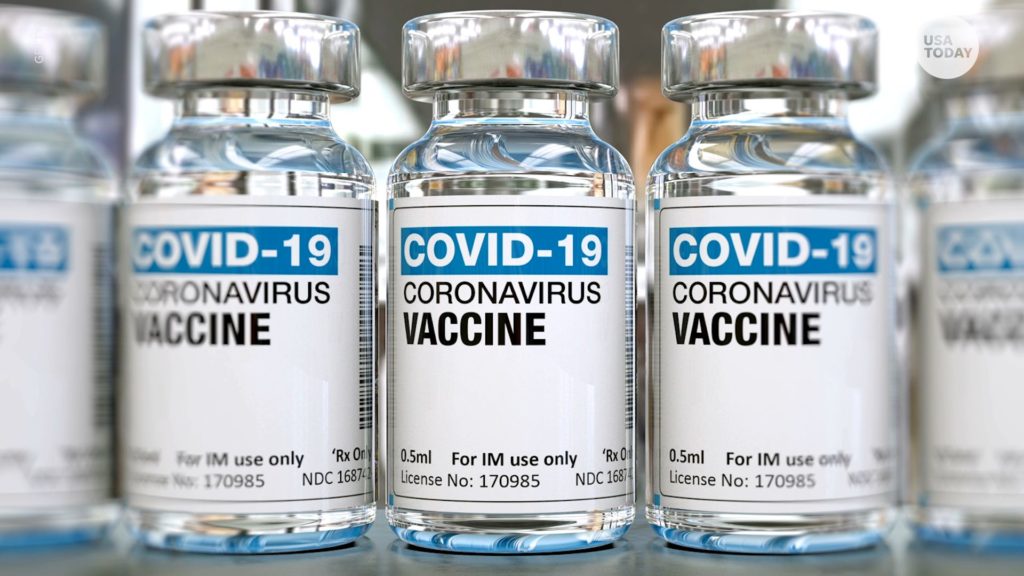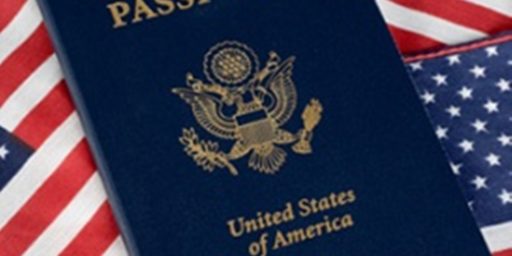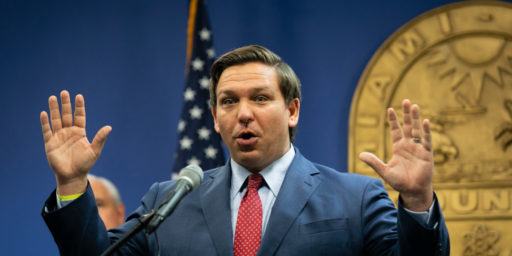US Should Have Federal Vaccine Passport
There are legitimate ethical and liberty questions but they're outweighed by the benefits.

In Tuesday’s post on “Incentivizing COVID Vaccination,” I pointed to Israel’s Green Pass, a government-issued certification that allows fully-vaccinated citizens to prove their status at restaurants and other public venues to resume pre-pandemic normalcy. While I support such a program here, I am leery of the obvious inequities that it would create.
POLITICO reports that President Biden is under pressure to emulate the Israeli model but is resisting, seeing the equity issues as outweighing the rather obvious benefits.
States, airlines and tech companies are pressuring the Biden administration to develop a federal standard for vaccine passports — a policy that could speed the economic recovery but might also discriminate against disadvantaged groups and jeopardize privacy.
Digital credentials showing proof of a person’s Covid-19 test results and vaccination status are rapidly being embraced as a tool to redesign workplaces and jump start travel and tourism. New York State is trying out an ”Excelsior Pass” to fast track reopening theaters and venues like Madison Square Garden. Hawai’i is developing a version that would let visitors skip the state’s mandatory 10-day quarantine.
But without White House involvement, industry leaders say they’ll be left with a confusing patchwork of unregulated and unreliable tracking tools that could invite fraud and raise troubling questions about risk and fairness.
Absolutely. Some states won’t enact programs at all. And residents traveling out-of-state will have difficulty getting their credentials recognized. Not to mention the much-increased risk of counterfeiting with multiple credentials out there.
The White House says the government shouldn’t issue the credentials or store the data. But it’s held discussions with tech firms on how a passport system might work, asking for details about whether pharmacies and other establishments might provide the necessary data. The Department of Health and Human Services has also sought input from 25 federal agencies on the passports, including if they’d encourage their own employees to use them, sources familiar with the conversations say. HHS’ national health technology office declined comment.
It’s awfully late in the game to still be figuring this out but, alas, we’re not quite two months into the Biden administration and its predecessor was, at best, incompetent in managing the crisis and, at worst, actively sabotaging efforts to respond. Still, you’d think career professionals at HHS and elsewhere would have been thinking through this problem.
“The right way is that it should be private, the data should be secure, the access to it should be free, it should be available digitally and in paper, and in multiple languages, and it should be open source,” White House Covid-19 adviser Andy Slavitt said on Monday.
In principle, I agree with all of that. But this seems to be a case of satisfying political constituencies at the cost of efficiency. Maybe get it available in English, our de facto national language for centuries, now and worry about other languages later? Hell, make it mostly pictorial for all I care—just get the damn thing out. And, frankly, if Microsoft or Apple or someone can make it happen fast, we should prioritize speed over fealty to open source.
The passports have been discussed since early in the pandemic, when antibody tests and accompanying apps to were being touted as a tool for reopening the economy. But businesses are reviving the pitch with vaccinations on the rise and travel picking up: A coalition of aviation and travel groups this month called for a federal standard, saying passports would not only accelerate a recovery but expand testing and vaccinations while limiting disease spread.
“There’s a role for the U.S. government to set standards,” particularly to ensure the credentials are “interoperable,” or talk with other systems efficiently across borders, said Tori Barnes, executive vice president of public affairs and policy at the U.S. Travel Association.
While I support devolution of many aspects of government to state and local jurisdictions, this would seem to be an obvious case for centralization. (I’d be happy for everyone to get free federal passport-passports that could be embedded with things like drivers licensing permissions and restrictions as well as vaccination status.)
The other concerns are much more salient to me:
Public health experts and bioethicists say digital credentialing could discriminate against disadvantaged populations. The Electronic Frontier Foundation, a digital rights group, argues that using smartphone-based verification to access public places would create a two-tiered system that bars people who can’t work, shop or attend school because they don’t have a cell phone or access to testing.
Granting that just about everyone I encounter in life, including laborers, has a smartphone, I’m sure there are plenty of folks who still can’t afford them. And goodness knows our patchwork healthcare system leaves too many people behind. But we can surely issue some sort of ID card that people can carry in addition to making the certification available digitally.
Beyond the ethical considerations is the separate question of whether the fragile U.S. health tech infrastructure can withstand a barrage of new apps tapping vaccine data.
Data troves containing immunization records vary in quality from state to state and may not be able to handle a surge of real-time queries about vaccination status, said Deanne Kasim, executive director at Change Healthcare, which is part of a consortium including Microsoft and Salesforce working on standards and technology for passports. Her company argues for a “lighter lift” and teaming up with pharmacies, which have more robust record-keeping systems.
I’ll have to defer to those who study the issue that this is big lift. But that would seem all the more reason to have this centralized in some fashion.
There also are privacy considerations. Requiring people to store test and vaccination results in digital format could expose them to the kind of data breaches that have proliferated during the pandemic. “We wanted data to reside on patients’ phone” as opposed to a database, where individuals can control the data, Kasim said.
Efforts to create passports could also run into legal barriers, said Rebecca Coyle, the executive director of the American Immunization Registry Association. Privacy laws restrict the kind of data some registries can share. Tech interests have asked the HHS national coordinator for health technology to issue national guidance so that “different solutions return the same information,” Coyle said.
I haven’t expended much effort thinking through this issue but, offhand, it seems trivial. There’s no reason for this passport to store more than a name, photograph, and vaccination status. I’m sure that information can be exploited by people more clever than me but it doesn’t strike me as that catastrophic compared to the massive benefits of being able to prove that one is vaccinated.
Some states are looking at getting ahead of the feds and regulating the still-nascent field, Kasim said. Several legislatures, for example, have introduced bills to prevent discrimination for people with religious objections or health conditions that might prevent them from getting immunized.
While I’m not religious, I try to bend over backward in respecting religious accommodations. And, certainly, we need to think through the implications for those who can’t get the vaccine. But the bottom line is that, if you’re not vaccinated, you’re a threat. The negative externalities—you could literally kill people—would seem to outweigh whatever liberty interests you have.






I’d be more comfortable with a vaccine passport if it were settled that vaccinated individuals can’t transmit the virus.
@gVOR08:
This is helpful, although as yet there’s no definitive answer to your question:
http://www.cdc.gov/coronavirus/2019-ncov/vaccines/fully-vaccinated.html
There’s also the possibility of booster shots being required. A one time card might not be such a hard pull, but when you have to start adding booster shot data at a later date, that will complicate things. A centralized database will be essential.
@gVOR08: But even if we can’t know that for sure, it’s a calculated risk many of us would be willing to take. Restaurant and hotel owners, for example, would like to be able to offer vaccinated-only spaces and I, for one, would be willing to travel and dine out much more readily with that safeguard in place.
Yeah, you haven’t given it much thought and it isn’t trivial.
To be meaningful it needs to be trusted. Right now, if you have been vaccinated, you have a paper vaccination record. A phone app that is not centrally controlled provides exactly the same reliability. If it is centrally controlled, you have to control for common identifiers – and deal with interoperability between phone OS – a heavy lift, particularly with android phones where the OS are fragmented and not consistent between phone models and manufacturers.
Ideally, we move towards a national ID that would help with these aspects as well as tying in health coverage and voting access but the politics of doing so in a country that has a large component of dysfunctional worship of “states rights” and anti-federalism are not promising.
If we do this, what is the rationale for not doing federal IDs? Especially for the purposes of voting?
That rationale should apply to masks. How’s that working out for us?
I don’t, and I never will. I desperately want to chuck the gd flip phone I have but my wife would not like it at all.
A former boss of mine traveled very widely – like crazy remote widely – and even back in the stone age of the 00’s had a travel card with his immunizations. We have apps for passports. We have MyChart. I’m willing to have a card and/or an app for my COVID vaccine – particularly if boosters will be needed.
@Blue Galangal:
When I moved out of the house, my mother handed me a file that had the following: a copy of my birth certificate, my social security card, medical records, my passport, and my shot record. Having grown up abroad, it is multiple books stapled together. I’ve continued to keep it updated, and any time I’ve been required to have vaccinations I’ve either brought the shot record with me or stuck the recorded vaccination paperwork in it. Only exception is the flu shot, I don’t bother keeping record of that.
It was a bit of a surprise to me when I realized that no one else really does this, other than my friends who do a lot of international travel for work.
@Blue Galangal: I go for my second dose and just this morning asked my wife if she thought I should bring my WHO card and ask them to stamp it. What’s odd is that I’ve never needed proof of vaccinations to get into any developed country, only ones that are more economically challenged. I’m not sure why.
@Jen: That’s a really good idea. Wish I’d thought of it for my sons.
Makes sense to me. Developed countries have immunized populations, undeveloped countries don’t.
I’m going in for my first shot today and pulled out my old WHO “International Certificates of Vaccination” in English and French – yellow booklet. Smallpox, Yellow Fever, Cholera, and other immunizations. An acquaintance headed to Nigeria this week and said there they are more worried about malaria and Ebola, Covid is just another disease to them.
Caught a segment on CNN in which an interviewer asked a diner full of Oklahomans whether anyone in the room thought getting vaccinated was a good idea. Of course, you know that no one did.
Thought of the idea of a Covid vax passport as it would apply to those good folks. Snorted at the absurdity and forgot the idea.
This is by god America! You think we’re going to stand in line nicely and do what good children are s’posed to do?
@Richard Gardner:
I have mine in a lockbox somewhere, a holdover from my Army days, but haven’t updated it since. Might be a good idea to find it before my 31 March Moderna booster/final.
It’s a nice thought but you can still be a carrier- not to mention the logistics of even trying to manage something that’s just going to morph into something else down the line. Plus, we’re allowing illegals into the country with no screening at all- where’s the logic in any of that? The “crisis, what crisis?” at the border needs more attention from the enabler in office, they’re here because of his words….even if he can’t remember them.
@Bill: The “crisis” that’s been going on since October, you mean? The immigrants that went untested and were released because Governor Abbott refused federal help on testing them?
@Bill: Remind me again…..who was President from October onwards?
@Jax: Bill has crawled back into his hole.
Yeah, that’s not how vaccines work and it’s not how the current COVID-19 “vaccines” are documented to do. The COVID-19 vaccines have been shown and signed off on to have 95% efficacy in preventing symptomatic COVID-19 and therefore the hospitalizations and deaths that come from symptomatic COVID-19. They have so far been indicating the possibility of sterilizing immunity, but that has not reach medical standards for the FDA to sign off on that.
So, being vaccinated, protects those likely to develop symptomatic COVID-19 by preventing symptomatic COVID-19. If you aren’t vaccinated, you are only a danger to yourself, and then that risk is for those older or with co-morbidities.
It may eventually be shown that having immunities, via prior infection or the “vaccines”, restricts the replication of the virus to the point that such individuals do not shed significant virus and thus would be minimal risk spreaders. But that is not in scientific evidence, yet.
@JKB:
You are a danger to every other human being who for whatever reason hasn’t been able to get a vaccine or will not be able to get a vaccine, and those who are still waiting to get a vaccine.
@James Joyner:
On the old yellow International vaccination record, they aren’t recording the Covid vaccine in it (I brought it with me, they didn’t have the required stamps/seal), BUT it is a great place to put the larger than a credit card white Covid record so you can find it. The CDC Covid vaccine record I got is won’t fit in my wallet without folding.
@Richard Gardner: Mine is, too, and that’s a problem.
@JKB:
Ok, I’ll bite… why the quotes around COVID-19 “vaccines”?
I’m sure the answer is going to be something really fucking dumb, but I’m curious as to how really fucking dumb.
@Richard Gardner:
That’s a good idea. I don’t get my second dose until the end of the month but I snapped a picture of the card and have it favorited on my phone.
@Richard Gardner: I have had a couple of vaccinations that I’ve stapled to unused pages in my WHO yellow passbook, to keep everything together.